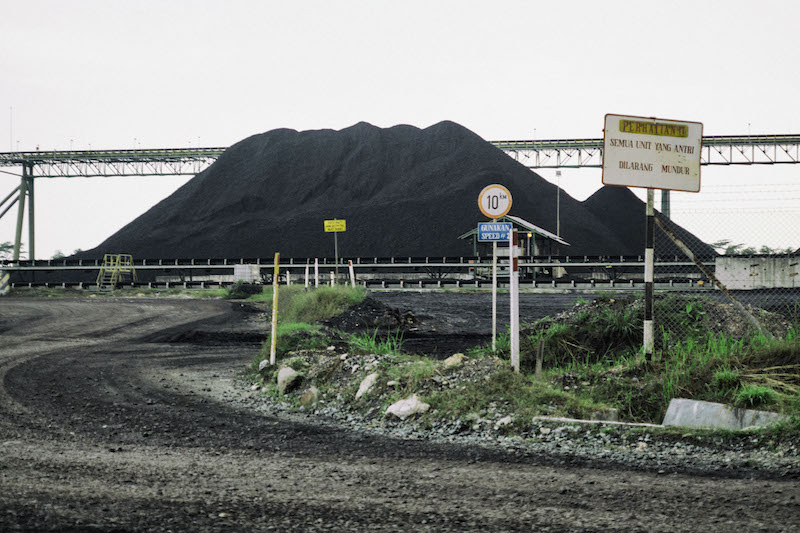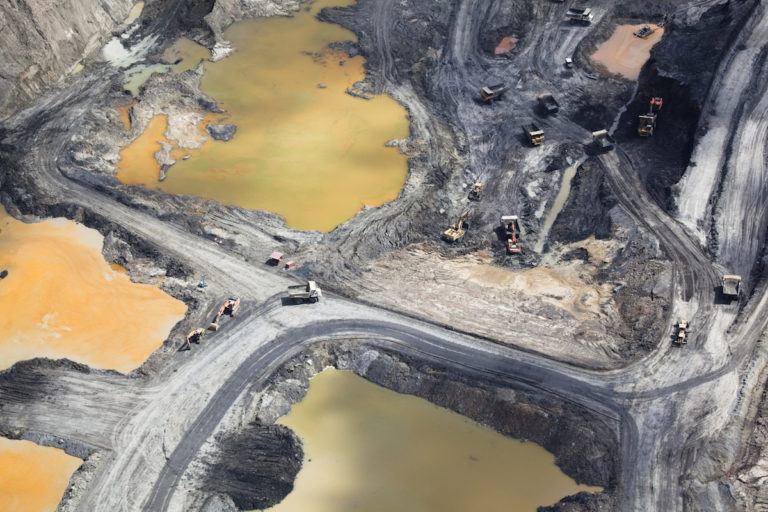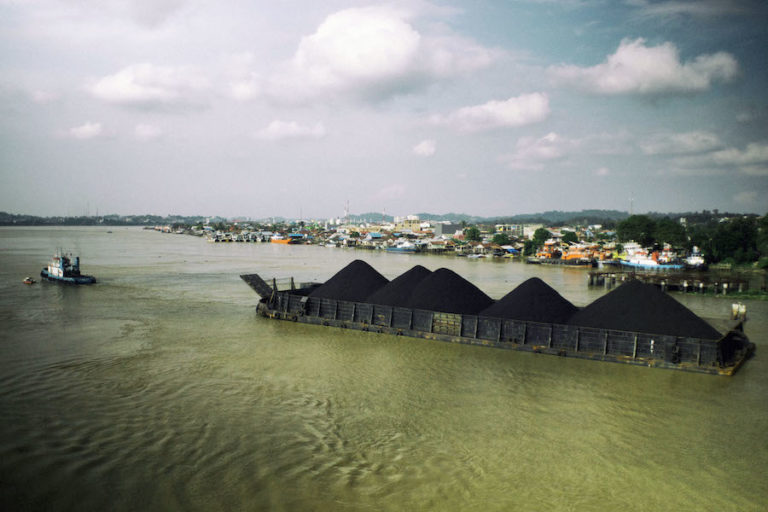After policies of decentralization gave regional governments more control over the mining sector, the number of permits issued exploded.
A countrywide investigation into Indonesia’s mining sector revealed that 2,522 mining permits do not fulfill clean and clear standards.
Investigations have revealed the government is owed $380 million in mining royalties.
Collecting remaining arrears proves challenging, as basic details about mining companies in arrears, including where offices are located – or if they exist at all – remain missing from government permit data.
Indonesia is now one of the world’s largest exporters of coal, an industry that contributes around four percent of the country’s gross domestic product mostly through exports to China and India. Despite its massive size, however, observers are concerned that the sector’s actual contribution to the public treasury — in the form of taxes and royalties — is not nearly enough to balance out the social and environmental impacts of coal extraction.
According to data from the Ministry of Energy and Mineral Resources, hundreds of millions of dollars in royalties and taxes owed to the government remain unpaid. The government often lacks key information it needs to collect the revenues owed to it, even down to the addresses of mining companies’ offices.

The consequences of decentralization
Indonesia’s decentralization era, beginning in the early 2000s, saw a shift in control over extractive industries from central to regional governments. The most significant law for the mining sector was the 2009 Mining Law, which gave district and municipal governments the authority to issue permits for mid-sized mines.
District government’s new authority to control permits did not come with an increase in budget or capacity to ensure that permits adhered to environmental laws. This, combined with a boom in global commodity prices, resulted in a subsequent explosion of mining permits across Indonesia, many of which have operated in violation of permit laws. According to the International Energy Agency, an estimated 74 million tons of coal were extracted illegally from small mining operations in Indonesia in 2013, contributing to an oversupply of coal.
Mining is now a major contributor to Indonesia’s economy. In 2014, revenue from the mining sector reached IDR 37.37 trillion ($2.8 billion), contributing around 10 percent of total state revenue, according to data from the extractive sector oversight body Extractive Industry Transparency Initiative (EITI). Government revenue from mining comes mainly from non-tax revenues in the form of royalties and land rent.

However, poor management and control of the mining permitting process — particularly for small to medium-sized mining concessions — has led to an excess of mining permits being issued by district governments, without adequate oversight or enforcement of related laws.
Researcher Anna Funfgeld observed that 90 percent of Indonesia’s coal originates from Kalimantan, where strip mining is largely used to excavate coal close to the surface. The cheapest and most favored form of extraction, strip mining causes the destruction of landscapes and agricultural land and the contamination of water and soil, Funfgeld found.
Poor management in the issuance of mining licenses has meant that an excess of mining concessions has been issued, including in areas zoned for other purposes. According to a network of regional and nationally-based NGOs called Anti-Mining Mafia Coalition, 6.3 million hectares of mining concessions have been allocated illegally within forests zoned for protection.
Evidence of excessive and poorly regulated mining permitting emerged in the findings from a recent investigation by the National Human Rights Commission and NGO groups into the mining sector in East Kalimantan, where the majority of Indonesia’s coal is sourced. The investigation revealed that almost 70 percent of the province has been allocated for mining concessions. The same study found that 632 coal mining pits have been left abandoned across East Kalimantan. These pits often fill with water, and have been the cause of 27 deaths by drowning to date, including 21 children.
Poor management of mining permits has also resulted in revenue “leakage,” as financial dues – such as royalties and land tax – owed by mining companies are left unpaid. The revenues that are able to be collected from the coal sector in no way outweigh the expenses needed to address the extensive social and environmental damages brought by poorly managed mining operations, Merah Johansyah, the national coordination of JATAM, Indonesia’s Mining Advocacy Network, told Mongabay. “These include the impacts of flooding, forest destruction, community conflict and river and water source pollution,” he said.

The central government’s response
Indonesia’s central government responded to problems in coal-mine permitting by tightening coal mining sector regulations, including introducing a clean and clear certification system. To obtain a clean and clear certificate, mining companies must prove they have no outstanding royalty and other tax debts; that rehabilitation funds have been collected and saved in a government bank account; that exploration and environmental commitments have been fulfilled; and that concession areas do not overlap with protected forest areas or with other companies’ concessions, including for palm oil and timber plantations.
In early 2014, following initial civil society reports of significant corruption, illegalities and environmental and social damage in the mining sector, the Corruption Eradication Commission (KPK), together with the Ministry of Energy and Mineral Resources and the Ministry of Environment and Forestry, began investigations into mining operations in 12 provinces with the largest number of mining permits. The initiative, called Korsup Minerba, aimed to assess the legality of mining permits, ensure companies were registered to pay tax, land rent and other royalties, and determine whether permits adhered to all relevant permitting and environmental laws.
The Korsup Minerba investigations began in February 2014, when there were a total of 10,992 locally-issued licenses across Indonesia. Within a year, investigations revealed that 40 percent of these licenses were non-clean and clear.
By April 2017, data from the energy ministry indicated that already 2,187 permits had been canceled or their operational period had ended and not been extended. The total number of permits active in Indonesia had reduced to 8,524 mineral and coal mining permits. However, 2,522 mining permits active in Indonesia are not clean and clear. After three years of implementation, Johansyah is concerned that the Korsup Minerba is yet to result in any significant improvements in mining governance.
“The clean and clear certification system is only a desktop exercise, to check that all documents are in place. It does not involve a site assessment,” Johansyah said. Clean and clear certification may not reflect whether companies’ operations adhere to environmental and human health protection laws. There are many instances of mining companies that violate laws but that hold clean and clear certification, Johansyah reported: “A child drowned in an abandoned mining pit in Kutai Kartenegara owned by a clean and clear mining company, PT Multi Harapan Utama.”

Efforts to clean up the mining sector also face challenges in collecting remaining debts owed. Mineral and coal mining companies owe the government a total of IDR 5.07 trillion ($380 million). Although this is a reduction from the total of IDR 6.65 trillion owed in December 2016, collecting the remaining arrears is proving to be difficult. “Collecting royalties has not been as easy as we initially thought. There are many obstacles,” an energy ministry official told Tempo in February.
Divisions in authority and a disconnect between central and regional government has made collecting revenues challenging. Although district, and now provincial governments are empowered to issue permits for mining, responsibility for collecting royalties, land rent and taxes lies largely with the central government.
As Hendra Sinadia, the deputy director of the Coal Production Association has observed, this has resulted in major gaps in data on mining operations between different levels of government. “I am certain the government does not have accurate data about coal mining production. Ever since the authority for mining has been with the regional government, the total number of mining permits has been hard to trace,” Sinadia told CNN Indonesia in January.
A lack of accurate data on mining permits, combined with a lack of resources, makes it difficult for the collection of state revenues from mining companies, explained Agung Budiono, communication and outreach manager at mining sector oversight NGO Publish What You Pay Indonesia.
“The Directorate General of Mineral and Coal Mining already has detailed data that includes the names of the thousands of companies that are in arrears. However, one of the biggest challenges has been that after tracing the names of the companies in arrears, it emerges that their existence is unknown. The addresses used when applying for a permit were not provided correctly,” Budiono told Mongabay.
It is not known whether the addresses were fake or companies have moved since registering for mining permits. “The Director General of Mineral and Coal Mining sent letters to mining permit holders in an effort to recover non-tax state revenues owed to the government. However, many of the letters came back return to sender, indicating the addresses are incorrect,” said Budiono.
The Anti-Mining Mafia Coalition are pushing for more transparency in the issuance of mining permits. Making public all mining permits in Indonesia, including their full names and addresses, as well as their progress towards meeting clean and clear certification, would help to ensure better civil society oversight, said Ali Adam Lubis, a representative of the Anti-Mafia Coalition in a media statement.
“Going forward the government needs to blacklist individuals or companies that don’t comply with laws. It is important to make data on mining permits available to the public and law enforcement agencies,” Budiono told Mongabay. Partnerships between government agencies like the Directorate of Mineral and Coal Mining and the Directorate of Common Law Administration, could also help government to identify debt-owing mining permit holders, said Budiono.

Cracking down on non-compliant mining companies brings its own challenges for provincial governments. Governors who have canceled non-clean-and-clear permits are facing resistance from the mining sector and from district governments. Already 20 mining companies that have had their permits revoked are threatening to sue provincial governments. Budi Santoso, Director of the Centre for Indonesian Resources Strategic Studies, said that mining companies base their cases against provincial governments on the lack of legal strength with clean and clear certification. “Mining permits that are revoked for not having clean and clear status can potentially be contested, because clean and clear does not have a legal basis,” Santoso told Kontan.co.id.
There are reports that district heads are also pushing back against the cancelation of permits. In East Kalimantan, 59 percent of the 1,404 mining permits issued to coal companies are not clean and clear and are at risk of revocation. The governor told local media in April that he is under pressure from district heads to not make problems for coal mining companies by canceling their permits.
The government is seeking to increase revenues from mining by increasing royalty rates paid by mining companies. In February 2017, the House of Representatives decided that smaller coal mining companies will have to pay royalty rates of between 10 to 13 percent, depending on the quality of coal they mine – an increase of the current royalty rates of 3.5 to 7 percent. Parliamentary lawmakers are optimistic that these increased royalty rates will see state revenue rates increase.
Environmental activists caution, however, that without improvements to the government’s management of the mining sector, the increased royalty rates may also not result in increased state revenues. Appropriate law enforcement must follow for companies that don’t obey laws, said Johansyah.
Source: Mongabay